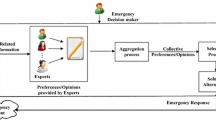Abstract
This paper presents a group decision-making approach for managing unconventional emergency situations using the internet. In unconventional emergency events, the expediency of developing a response strategy is of utmost importance in group decision-making environment. The research of this paper aims to rapidly develop and execute the response approach to the unconventional emergency events. We develop an agile Delphi decision-making platform based on ASP.NET. The platform proposed in the paper also provides the function of identifying risk preference and cognitive style of the decision-making experts, which allows experts to conduct appropriate alternative portfolio and enables researchers to find a new combination of experts to make the decision-making more efficient. This paper concludes with an empirical analysis in which the sedimentation event that occurred at Wuhan subway is illustrated using the proposed methodology.



Similar content being viewed by others
References
Aleskerov F, Say A, Toker A, Akin H, Altay G (2005) A cluster-based decision support system for estimating earthquake damage and casualties. Disasters 29(3):255–276
Bi X, Su W, Wang L (2012) An analysis on the macroscopic growth process and stage of information systems development in Chinese enterprises. Inf Technol Manage (online first). doi:10.1007/s10799-012-0115-z
Blais A, Thompson M, Baranski J (2005) Individual differences in decision processing and confidence judgments in comparative judgment tasks: the role of cognitive styles. Pers Individ Differ 38(7):1701–1713
Boynton L (2006) What we value: a delphi study to identify key values that guide ethical decision-making in public relations. Public Relat Rev 32(4):325–330
Calhoun C (2004) A world of emergencies-fear, intervention, and the limits of cosmopolitan order. Can Rev Sociol 41(4):373–395
Capozucca A, Guelfi N (2010) Modelling dependable collaborative time-constrained business processes. Enterp Inf Syst 4(2):153–214
Chakraborty I, Hu P, Cui D (2008) Examining the effects of cognitive style in individuals’ technology use decision making. Decis Support Syst 45(2):228–241
Chen X, He Y, Huang H (2011) An approach to automatic development of interlocking logic based on state chart. Enterp Inf Syst 5(3):273–286
Erol O, Sauser B, Mansouri M (2010) A framework for investigation into extended enterprise resilience. Enterp Inf Syst 4(2):111–136
Fang Y, Lee B, Chou T, Lin Y, Lien J (2009) The implementation of SOA within grid structure for disaster monitoring. Expert Syst Appl 36(3):5784–5792
Helbing D, Farkas I, Vicsek T (2000) Simulating dynamical features of escape panic. Nature 407:487–490
Kleindorfer P, Saad G (2005) Managing disruption risks in supply chain. Product Operat Manag 14(1):53–68
Lee J, Bui T (2000) A template based methodology for disaster management information systems. In: The proceedings of the 33rd annual Hawaii international conference on system sciences, vol 2, p 7
Li L (2011) Introduction: advances in e-business engineering. Inf Technol Manage 12(2):49–50
Linstone HA, Turoff M (1975) The delphi method—techniques and applications. Addison-Wesley Publishing Company, Reading
Liu D, Deters R, Zhang W (2010) Architectural design for resilience. Enterp Inf Syst 4(2):137–152
Liu L, Wei Y, Shen Y, Wang X (2010) Scenario-based research on unconventional emergency decision-making. 2010 IEEE international conference on emergency management and management sciences (ICEMMS), Beijing, pp 519–522
Rodrigues A, Santos M, Santos A, Rocha F (2002) Dam-break flood emergency management system. Water Resour Manage 16(6):489–503
Saloma C, Perez G, Tapang G, Lim M, Palmes-Saloma C (2003) Self-organized queueing and scale-free behavior in real escape panic. Proc Natl Acad Sci USA 100(21):11947–11952
Shi H, Liu L (2011) An evolution model of unconventional emergency impact. 2010 IEEE international conference on emergency management and management sciences (ICEMMS), Beijing, pp 79–82
Shiloh S, Shenhav-Sheffer M (2004) Structure of difficulties in mate-selection decisions and its relationship to rational and intuitive cognitive styles. Pers Individ Differ 37(2):259–273
Sisiopika V (2007) Application of traffic simulation modeling for improved emergency preparedness planning. J Urban Plan Dev 133(1):51–60
Steinert M (2009) A dissensus based online delphi approach: an explorative research tool. Technol Forecast Soc Chang 76(3):291–300
Sung M, Gleicher M, Chenney S (2004) Scalable behaviors for crowd simulation. Comput Graph Forum 23(3):519–528
Tang A, Wen A (2009) An intelligent simulation system for earthquake disaster assessment. Comput Geosci 35(5):871–879
Wang J, Gao F, Ip W (2010) Measurement of resilience and its application to enterprise information systems. Enterp Inf Syst 4(2):215–223
Wang L, Zeng J, Xu L (2011) A decision support system for substage-zoning filling design of rock-fill dams based on particle swarm optimization. Inf Technol Manage 12(2):111–119
West D, Dellana S (2009) Diversity of ability and cognitive style for group decision processes. Inf Sci 179(5):542–558
Xie K, Chen G, Wu Q, Liu Y, Wang P (2011) Research on the group decision-making about emergency event based on network technology. Inf Technol Manage 12(2):137–140
Xu L (1979) Technological forecasting and assessment. Correspondence of Chinese Society of Natural Dialectics. (34) August 10 (in Chinese)
Xu L (2011) Enterprise systems: state-of-the-art and future trends. IEEE Trans Industr Inf 7(4):630–640
Xu S, Xu L (2011) Management: a scientific discipline for humanity. Inf Technol Manage 12(2):51–54
Yang T, Hsieh C (2009) Six-sigma project selection using national quality award criteria and delphi fuzzy multiple criteria decision-making method. Expert Syst Appl 36(4):7594–7603
Zhang W (2010) Guest editor’s foreword. Enterp Inf Syst 4(2):95–97
Zhang W, Lin Y (2010) On the principle of design of resilient systems-application to enterprise information systems. Enterp Inf Syst 4(2):99–110
Acknowledgments
This project was partially supported by the NSFC (National Natural Science Foundation of China) Grant 90924010 and 71132008, Changjiang Scholar Program of the Ministry of Education of China, and the US National Science Foundation Grant 1044845.
Author information
Authors and Affiliations
Corresponding author
Rights and permissions
About this article
Cite this article
Xie, K., Liu, J., Chen, G. et al. Group decision-making in an unconventional emergency situation using agile Delphi approach. Inf Technol Manag 13, 351–361 (2012). https://doi.org/10.1007/s10799-012-0122-0
Published:
Issue Date:
DOI: https://doi.org/10.1007/s10799-012-0122-0




